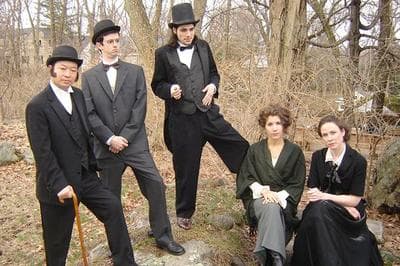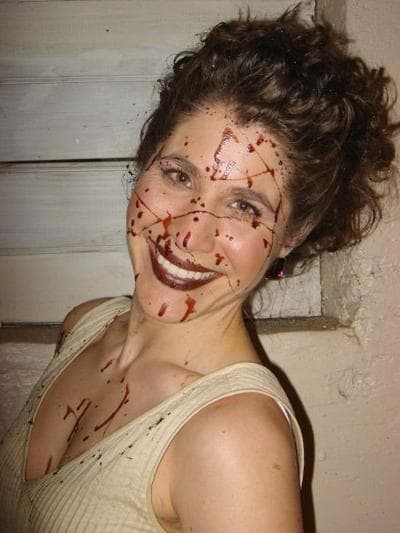Advertisement
48 Hours And Counting: Whiz-Bang Filmmaking Speeds Through Boston

This weekend a celluloid dream (or nightmare) comes true for hundreds of film fanatics here. They’ll have the chance to make creepy, gory, sensational, heart-warming, schlocky, intense movies of their own; short films that might actually end up splashed across big screens in Boston.
But there’s a catch: they’ll only have 48 hours to do it.
Gallons of coffee, pure adrenaline and an unbridled passion for film fuels the 48-Hour Film Project.
It’s an annual event where established, aspiring, even accidental filmmakers get in on the action. Actors, cinematographers, lighting technicians, sound designers, and make-up artists put their skills to the test over the course of one very long weekend.
Here’s how it works:
Friday between 6-7 p.m., nearly 100 teams will pick genres out of a hat, including "buddy film," drama, fantasy, horror, romance — even silent film.
Next, every team gets assigned the same character, prop and line of dialogue. For example:
Character: Marty or Mary Quinzani, Second-in-Command
Prop: A magnet
Line of Dialogue: "Yes! I mean, I hope so."
Then they're off to the races. Their final films must be short — no longer than seven minutes.
In 2006, improv comedian Michelle Barbera ran the 48-hour film gauntlet in Boston for the first time. She keeps coming back for more.
“I'd never made a movie or worked on a movie beyond a little acting and extra work,” she said. Now she’s a 48-Hour veteran.
The first two years, Barbera’s team got lucky. They picked their favorite type of film: “We're all into the horror genre, which is one of the most fun to film,” she said. “Buckets of fake blood, zombie attacks and 1950s-style vampires make for a good time.”
"Winston and Wilma"
Now, she explained, “my team has made several short films and even a sitcom pilot, 'Our Living Blue Planet.' " It screened at the Independent Television Festival in 2009.
Empowering people to the joy — and relative ease, these days — of filmmaking is part of the point, according to 48-Hour Film Project co-founder Liz Langston.
She and her partner started it as a riff on a 24-hour play series that was happening in New York. But since their project’s launch in 2001, it’s become an annual, global tradition. Projects can be found in 85 cities-- including Casablanca, Granada and Johannesburg — in 24 countries. In total, 45,000 people will make 3,000 movies around the world.
And Boston is one of the largest cities, with 1,500 people making approximately 100 movies.
As Langston sees it, the movie-making marathon is an excellent excuse to let loose and get creative. “For professionals and semi-professionals, it offers a chance to finish a short narrative film in a weekend. It’s not an education film, or a commercial or an industrial film. It lets film professionals do something that’s not dictated by the purchaser. There are no creative constraints.”
And it’s a blast, Langston says. “Some people even follow the 48-Hour Film Project from city to city, doing this all over the country,” she said. But, Langston adds, “Boston is one of our most established cities.”

Ben Guaraldi is the project producer in Boston. He has been witness to the good, the bad and the ugly that materializes when participants undergo 48 hours of non-stop filmmaking.
"At the beginning of kick-off the teams are exuberant, often to the point of jumpiness," he said. "Some are nervous about the genre they will pick, some aren't. They're blissful."
What about 48 hours later?
"On Sunday night, it's a different story," Guaraldi explained. "Some are spent; some are frantic."
The mania is fed by the fact that if teams don't drop off their completed short film by 7:30 p.m. sharp, they will be disqualified.
Of the 97 teams expected this weekend, Guaraldi predicts that 80 will be on time.
“Fifteen to 20 percent of them don't make a deadline,” he said. “Sometimes they brush it off casually, but sometimes they burst into tears."
Films that make the Sunday night deadline will be screened for the public at the Kendall Square Cinema on May 4-6 and May 11. Judges will be sitting in the audience, too, choosing “Boston’s Best Film.” The winners will then go on to compete nationally at an event known as Filmapalooza.
48-Hour Film Project co-founder Langston had these words of advice for people who might entertain the idea of whiz-bang filmmaking: “Do it! Get off the couch and start shooting. If you don’t know everything about making a film, don’t worry. Someone on your team will know what you don’t know.”
And hopefully someone on the team will know how to make plenty of really strong coffee.
This program aired on April 30, 2010. The audio for this program is not available.
